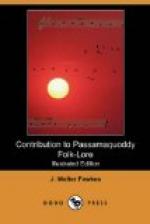15. Tale of Leux and Hespens.
17. An ancient war song, said to have been sung in the old times when the Passamaquoddies were departing for war with the Mohawks. A second part contains a song said to have been sung in the “Trade Dance,” as described below.
18. War Song.
19. Pronunciation
of the names of the fabulous personages
mentioned in Passamaquoddy
stories.
20-22. Story of
the birth of a medicine-man who turned man
into a cedar tree.
23. An ordinary
conversation between the two Indians, Noel
Josephs and Peter Selmore.
24-27. Modern Passamaquoddy
story, introducing many
incidents of ordinary
life.
29-35. Story of Pogump and the Sable, and of their killing a great snake. How the former was left on an island by Pookjinsquess, and how the Morning Star saved him from Quahbet, the giant beaver.[2]
[Footnote 2: I have given below English versions of these, or the Indian stories told in English.]
It appears to me that the selections above given convey an idea of some of the more important linguistic features of the Passamaquoddy language, but it is needless to reiterate that these results and observations are merely experimental. In another place I hope to reproduce the stories in the original, by phonetic methods. I have here given English versions of some of the stories recorded, as translated for me by the narrator, or by Mrs. Brown, and added some explanations which may be of assistance to a person listening when songs or stories are being rendered on the phonograph.
The majority of the remnants of the Passamaquoddy tribe are found in three settlements in the State of Maine,—one at Pleasant Point, near Eastport; another at Peter Dana’s Point, near Princeton; and a third at a small settlement called The Camps, on the border of the city of Calais.
The manners and customs of this people are fast dying out. The old pointed caps, ornamented with beads, and the silver disks, which they once wore, are now rarely seen except in collections of curiosities. The old games, dances, and songs are fast becoming extinct, and the Passamaquoddy has lost almost everything which characterized his fathers.
There still remain among the Passamaquoddies certain nicknames borne by persons of the tribe. These nicknames are sometimes the names of animals, and in older times were more numerous than at present. Possibly these names are the survivals of the gentile or clan name once universal among them as among other Indian tribes.




